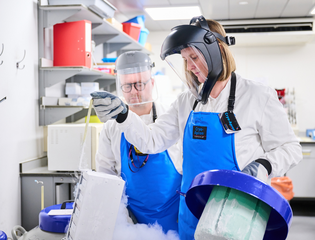Ovarian cancer prevention
How to reduce your risk of ovarian cancer
While it isn’t possible to completely prevent ovarian cancer, there are actions you can take to reduce your risk of getting ovarian cancer. Here are some of the preventative measures and lifestyle considerations that can reduce your risk of developing ovarian cancer.
Can ovarian cancer be prevented?
There is no known way to completely prevent most ovarian cancers. But there are things that you can do that might lower your risk. Some risk factors for ovarian cancer are unavoidable such as getting older.
But women may be able to lower their risk by staying at a healthy weight, avoiding smoking and talking to your GP if you have a family history of cancer.
Understanding how the BRCA gene fault, lynch syndrome and endometriosis increases risk is an important first step.
How to reduce your risk of ovarian cancer
The risk of developing ovarian cancer increases with age, with more than half of all cases in the UK in women aged 65 and over. Anyone born with ovaries is at risk of being diagnosed with ovarian cancer, even if they have later had them removed.
While you cannot always prevent ovarian cancer, there are risk-reduction measures, lowering your chances of developing the disease and which may improve your overall health.
Taking oral contraceptives
Using oral contraceptives (birth control pills) can reduce the chances of developing ovarian cancer for average-risk women and BRCA mutation carriers., particularly if used for five years or more. This protective effect is thought to last for many years even after you stop taking the pill.
However, we also know that taking oral contraceptives can increase the risk of developing breast cancer, so it is not recommended for everyone. This is an individual decision that should be discussed with your doctor to weigh up the risks and benefits.
Pregnancy
Having children seems to reduce the risk of ovarian cancer. The more children you have, the lower the risk. Multiple pregnancies or having first full-term pregnancy before the age of 26 decreases risk.
This reduction in risk may be because while you are pregnant, you’re not ovulating (releasing eggs). The fewer times you ovulate in your lifetime, the lower the risk of ovarian cancer.
Breastfeeding
Breastfeeding is linked to a reduction in the risk of ovarian cancer. The longer women breastfed, the greater the risk-reduction. It’s thought that breastfeeding helps reduce ovarian cancer risk because it can delay ovulation, and that people who ovulate for longer over their lifetimes may have a higher risk of developing ovarian cancer.
But neither pregnancy nor breastfeeding combined guarantee that you won’t develop ovarian cancer.
Preventative surgeries for ovarian cancer / risk-reducing surgery
Surgery to remove both ovaries and fallopian tubes (called bilateral salpingo-oophorectomy or BSO) is estimated to reduce the risk of ovarian cancer by 95%. If this surgery is done due to a high-inherited risk of ovarian cancer, this surgery is called “risk-reducing”.
- Can a hysterectomy can prevent ovarian cancer? Many women have a hysterectomy (surgical removal of your womb) due to issues such as fibroids, prolapse, or endometriosis/ adenomyosis. Research has shown that having your womb removed may also reduce your risk of some types of ovarian cancer. This may depend on the exact type of hysterectomy you had as some of this risk reduction may be due to the removal of the fallopian tubes, which is where some ovarian cancers start.
- Tubal Ligation or “having your tubes tied” Studies of women who underwent tubal ligation (“tying the tubes”) to avoid future pregnancies suggest their future risks of ovarian cancer dropped by 25% to 65% compared to their peers.
- Salpingectomy The surgical removal of fallopian tubes in a procedure known as a salpingectomy may prevent the most common subtype of ovarian cancer from developing. The procedure can be performed as part of other routine gynaecologic surgeries (known as “opportunistic” salpingectomy) even when there is no known family history of the disease.
- Risk-reducing bilateral salpingo-oophorectomy RRBSO For women at high risk of ovarian cancer due to an inherited faulty gene like BRCA or Lynch syndrome, current advice is to consider having their ovaries and fallopian tubes removed (plus their womb in Lynch syndrome) which will reduce their risk of ovarian cancer by 95%. This is called Risk-reducing bilateral salpingo-oophorectomy RRBSO.
Lifestyle choices that can help reduce the risk of ovarian cancer
Lifestyle changes, like maintaining a healthy diet and taking regular exercise, can have a significant impact on reducing your risk of several types of cancer. A 2018 study published in the British Journal of Cancer revealed that more than 135,000 cases of cancer could be prevented in the UK each year largely through lifestyle changes – that’s around 4 in 10 cases.
The lifestyle choices to consider are:
Not smoking
Smoking is the biggest cause of cancer. It's responsible for a huge 53,000 cases of cancer every year in the UK. Over recent decades, smoking rates in the UK have fallen considerably and the proportion of cancer cases caused by smoking has also decreased. In terms of ovarian cancer, smoking is thought to increase the risk of a subtype called mucinous ovarian cancer.
Maintaining a healthy weight
Obesity causes more than 60 cases of cancer a day making it the second biggest cause of cancer in the UK after smoking. Unlike smoking rates, obesity levels have risen over the last couple of decades so it’s important to take preventative measures to maintain a healthy weight including:
- Diet The recommendations include following a balanced diet, particularly plenty of fruits and vegetables, avoiding sugary beverages and limiting alcohol consumption
- Exercise Alongside your diet, exercising regularly can have a major impact on reducing your cancer risk.
What can you do if you are at risk of ovarian cancer?
A risk factor is anything that can increase your risk of cancer but having one or more risk factors doesn't mean that you will develop ovarian cancer.
It’s important to understand how other medical conditions and past cancer diagnoses may also put you at risk. Consider talking to your GP if any of the factors below put you at a greater risk of ovarian cancer.
Medical conditions
Studies have shown that women with endometriosis or diabetes have an increased risk of ovarian cancer. In diabetics, the increase in risk might be higher in those who use insulin.
However, it’s important to remember that endometriosis is a common condition, and many sufferers will not develop ovarian cancer.
Using hormone replacement therapy (HRT)
Using hormone replacement therapy (HRT) during/ after menopause slightly increases the risk of ovarian cancer Research is ongoing to work out exactly how much the risk is increased, but it is likely to be a small amount. While HRT may pose a small risk, the treatment can also be helpful for many women with menopausal symptoms and reduces the risk of other major illnesses and health problems, so for most people, the benefits outweigh the risks.
Previous cancer
You have an increased risk of ovarian cancer if you’ve had breast cancer in the past. The risk is higher in women diagnosed with breast cancer at a young age and those with oestrogen receptor negative (ER negative) breast cancer.
Find out if you're at risk of ovarian cancer
If you have family members with ovarian cancer, your risk may be higher than the average.
Women who have a mother or sister who has been diagnosed with ovarian cancer are thought to have around 3 times the risk of ovarian cancer compared to people without this family history. If this is the case, speak to your GP and make sure you are aware of the symptoms of ovarian cancer.
Depending on your family history of certain cancers you may be eligible for genetic testing that could tell you about your ovarian cancer risk. The guidelines around this are complicated so the best idea is to use our simple online tool to assess your risk and speak to your GP to find out more.
Understand more about your risks or use our simple online tool to assess your risk.


